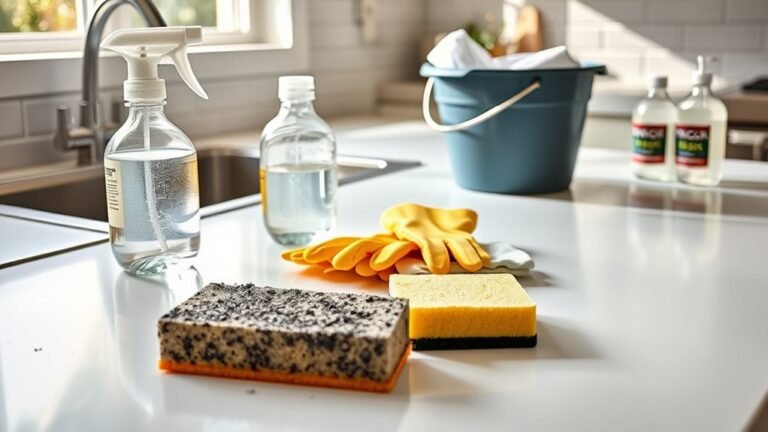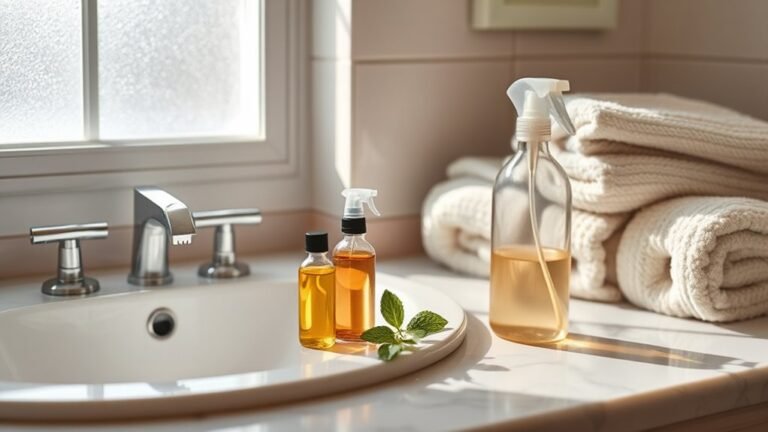Washing Grease Without Damage
To wash grease without damage, start by blotting excess oil gently, then sprinkle baking soda or cornstarch to absorb it. Use a dish soap made for cutting grease and apply it directly to the stain. Wash in the hottest water safe for the fabric, avoiding heat drying until the stain’s gone to prevent setting. For surfaces, choose gentle, non-toxic cleaners and soft tools to avoid scratches. Keep going, and you’ll discover even smarter ways to tackle grease effectively.
Identifying Different Types of Grease Stains

Before you can effectively clean grease stains, you need to identify what type you’re dealing with. Understanding the types of grease is key to gaining control over your stain removal process. Whether it’s cooking oil, motor oil, or industrial grease, each has unique properties that affect how you treat the stain. Stain identification starts with observing the color, texture, and source of the grease. For example, cooking oil stains are usually lighter and softer, while motor oil tends to be darker and thicker. By recognizing these differences, you can choose the best approach without damaging your fabrics. Once you master this skill, you’ll feel empowered to tackle any grease stain with confidence and freedom, avoiding unnecessary frustration or harm.
Essential Supplies for Effective Grease Removal
To tackle grease stains effectively, you’ll need the right cleaning agents designed to break down oils without harming your fabrics. Don’t forget to equip yourself with protective gear like gloves to keep your skin safe from harsh chemicals. Having these essentials ready will make the removal process smoother and safer.
Must-Have Cleaning Agents
Several key cleaning agents can make grease removal much easier without harming the surfaces you’re treating. You’ll want to start with natural cleaners like white vinegar, baking soda, and lemon juice. These eco friendly options break down grease effectively and let you avoid harsh chemicals that restrict your freedom to use them anywhere. Dish soap with grease-fighting formulas is another must-have; it’s powerful yet gentle enough for various surfaces. For tougher jobs, consider biodegradable degreasers designed to tackle stubborn buildup without leaving toxic residues behind. By choosing these must-have cleaning agents, you’ll keep your space clean, protect your health, and maintain freedom from harmful substances. Remember, the right supplies empower you to conquer grease safely and sustainably.
Protective Gear Essentials
Although cleaning grease might seem straightforward, using the right protective gear is crucial to keep yourself safe and comfortable throughout the process. First off, always wear protective gloves to shield your hands from harsh chemicals and stubborn grease. They let you tackle tough messes without risking skin irritation or damage. Don’t forget safety goggles either—grease splatters and cleaning agents can easily irritate or harm your eyes if you’re not careful. By gearing up properly, you maintain your freedom to clean efficiently while protecting yourself from unnecessary harm. It’s a simple step that guarantees you stay safe and focused, helping you get the job done right without setbacks. With the right protective gloves and safety goggles, you’ll handle grease removal confidently every time.
Step-By-Step Guide to Removing Grease From Clothing

When grease stains appear on your clothes, acting quickly can make all the difference in removing them effectively. First, gently blot the stain to absorb excess grease without spreading it. Then, sprinkle baking soda or cornstarch on the stain to lift oil before brushing it off. Apply a liquid dish soap directly to the area, as it’s designed to break down grease. Let it sit for about 10 minutes. Next, wash the garment in the hottest water safe for the fabric, following the care label. Avoid drying until the stain is completely gone, since heat can set grease permanently. These grease removal techniques and laundry tips empower you to keep your clothes fresh and unscathed, giving you the freedom to wear what you love without worry.
Techniques for Cleaning Grease Off Kitchenware
When it comes to cleaning grease off your kitchenware, choosing the right degreasing agents can make all the difference. You’ll also want to use safe methods that protect your cookware’s surfaces from damage. Let’s explore how to tackle grease effectively without harming your kitchen tools.
Effective Degreasing Agents
Choosing the right degreasing agent is key to removing stubborn grease from your kitchenware without causing damage. You want products that free you from harsh chemicals yet deliver powerful results. Biodegradable solutions are perfect—they break down naturally, protecting both your health and the environment. Non toxic cleaners give you peace of mind since they’re safe around kids and pets, making your kitchen a worry-free zone. When selecting your degreaser, look for ingredients that target grease effectively without stripping or dulling your cookware’s finish. This way, you maintain your freedom to cook and clean without compromise. By choosing eco-friendly, gentle agents, you protect your kitchenware’s longevity while embracing a cleaner, greener lifestyle that aligns with your values.
Safe Cleaning Methods
After selecting the right degreasing agents, you’ll want to apply cleaning techniques that protect your kitchenware while effectively removing grease. Start by soaking greasy items in warm water mixed with eco friendly solutions like vinegar or baking soda—they’re powerful yet gentle. Use soft sponges or cloths to avoid scratching surfaces, honoring the care your kitchenware deserves. For fabric care, such as grease-stained dish towels, pre-treat with a natural degreaser before washing them separately in warm water. Avoid harsh scrubbing or abrasive tools that can wear down finishes. By combining mindful soaking and gentle scrubbing with eco friendly products, you’ll maintain your kitchenware’s integrity while freeing it from grease. This approach lets you clean confidently without sacrificing your values or the freedom to use your favorite tools.
Preventing Surface Damage
Although grease can be stubborn, you can prevent surface damage by using gentle techniques tailored to your kitchenware. Prioritize surface protection and stain prevention by choosing the right cleaning tools and methods. Avoid harsh scrubbing that scratches surfaces and opt for soft cloths or sponges instead.
| Technique | Tool | Benefit |
|---|---|---|
| Soak in warm water | Soft sponge | Loosens grease gently |
| Use mild detergent | Microfiber cloth | Protects surface shine |
| Rinse thoroughly | Soft brush | Removes residue |
Safe Methods to Erase Grease From Hard Surfaces
There are several reliable ways you can safely remove grease from hard surfaces without causing damage. Start by applying a gentle, grease-cutting solution like dish soap mixed with warm water. This simple approach uses effective grease removal techniques while keeping your surfaces intact. For tougher spots, sprinkle baking soda to absorb the grease, then scrub lightly with a soft cloth or sponge. Remember, surface protection tips include avoiding harsh chemicals or abrasive tools that can scratch or dull finishes. Always test your cleaning method on a small, hidden area first to confirm it won’t harm the surface. By using these safe, straightforward methods, you’ll enjoy freedom from stubborn grease without sacrificing the beauty or integrity of your hard surfaces.
Tips for Preventing Grease Stains in Everyday Life

Keeping your surfaces clean is easier when you take steps to prevent grease stains before they happen. Start by adopting smart kitchen habits—use splatter guards when frying, wipe spills immediately, and place absorbent mats near greasy work areas. Wearing aprons and using quality paper towels can minimize the mess too. When it comes to your clothes, don’t wait to tackle grease stains. Learn effective laundry techniques: pre-treat stains with dish soap or stain removers, use the right water temperature, and avoid drying until stains are fully gone. By embedding these habits into your routine, you gain freedom from stubborn grease stains and the frustration they bring. Prevention is your best tool to keep everything looking fresh without extra hassle.
Frequently Asked Questions
Can Natural Oils Help Dissolve Grease Stains Effectively?
You might find that natural solvents, like certain oils, can help dissolve grease stains effectively. They work by breaking down the grease through oil absorption, making it easier to lift from surfaces. If you want the freedom to clean without harsh chemicals, using natural oils offers a gentle yet powerful alternative. Just remember to test first, so you don’t risk any damage while enjoying a more eco-friendly way to tackle grease.
What Is the Best Way to Treat Grease on Upholstery?
When tackling grease on upholstery, you’ll want to act fast to prevent stains from setting. Start by gently blotting excess grease, then sprinkle baking soda to absorb it. For effective grease removal techniques, apply a small amount of dish soap mixed with warm water using a clean cloth. Blot, don’t rub, to avoid damage. Remember, upholstery cleaning tips like testing a hidden spot first help keep your freedom to enjoy fresh furniture without worries.
How Does Temperature Affect Grease Removal Efficiency?
When it comes to grease removal, temperature effects can really make or break your efforts. The higher the temperature, the better the grease solubility, meaning the grease dissolves more easily in warm water or cleaning solutions. But don’t throw caution to the wind—too much heat might damage delicate fabrics or finishes. So, you’ve got to strike a balance to free your upholstery from grease without causing harm.
Are Enzyme-Based Cleaners Safe for Removing Grease?
You’ll find enzyme-based cleaners pretty safe for tackling grease since their enzyme effectiveness targets grease molecules without harsh chemicals. These cleaners use natural biological agents, so cleaner safety is generally high, making them gentle on surfaces and better for the environment. If you want freedom from worrying about damage or toxic residues, enzyme cleaners let you clean efficiently while staying eco-friendly and safe for your home or workspace.
Can Grease Stains Be Removed After Repeated Washing Attempts?
You might feel like you’ve battled a never-ending grease stain war after repeated washing, but don’t lose hope! Stain persistence can be stubborn, yet with the right approach—like pretreating and using enzyme-based cleaners—you can often break free from that greasy grip. Keep experimenting with methods, and eventually, you’ll liberate your clothes from those marks, proving that repeated washing doesn’t have to mean permanent defeat.






